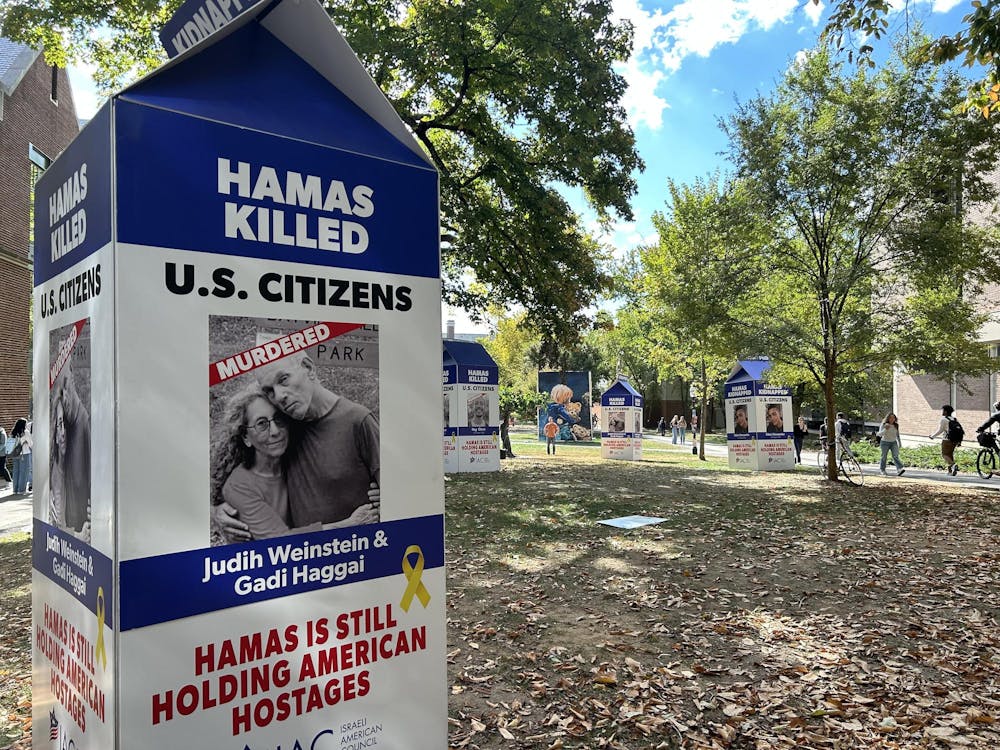An art installation on Wednesday, Oct. 8 sponsored by Tigers for Israel (TFI) and Chabad House on the Frist North Lawn, which was meant to draw awareness to the Israeli hostages held in Gaza and Hamas’ attacks on Oct. 7, 2023, may be the first test case of the University’s policy on symbolic structures following last spring’s ‘Gaza Solidarity Encampment.’
The exhibit notably included roughly half a dozen oversized mock milk cartons bearing the names, ages, and pictures of hostages with the words “Hamas Kidnapped U.S. Citizens” and “Hamas Killed U.S. Citizens,” as well as a tall mural depicting Ariel Bibas, a child taken hostage on Oct. 7, 2023. It also featured a sculpture of a blackened tree commemorating the Nova Music Festival, which was created by Israeli artist Neil Salti, who lost friends during the massacre.
TFI contacted the University about the exhibit and received permission in late September from the Office of the Dean of Undergraduate Students (ODUS) to erect these structures on the Frist North Lawn for up to two weeks, according to an email obtained by The Daily Princetonian. University spokesperson Jennifer Morrill confirmed that the sponsoring group had “obtained prior University approval, secured a space reservation, and worked with University offices on the mechanisms of the display.”
“It doesn’t feel to me like anything changed in the rules,” Rabbi Eitan Webb, the co-director of Chabad, said in an interview with the ‘Prince.’
ODUS policy requires that “exhibitions, interactive displays, walls, models, and other symbolic structures” obtain approval before installation and include attribution to a sponsoring group, including contact information.
Chabad and TFI collaborated with the Israeli American Council, a nonprofit who had access to all three pieces, Webb said, to bring them to campus. A similar exhibit was displayed at Columbia on Monday, Oct. 7. The mock milk cartons — a callback to the campaigns that displayed photos of missing children on milk cartons — have also visited Harvard and the Democratic National Convention in Chicago.
“It’s very in your face, but it’s done in a way which is educational, and that’s important for me. It’s done in a way which sparks conversation,” Webb said when asked why the groups wanted to bring the pieces to campus.
Three reservists in the Israeli Defense Forces (IDF) who had fought in Gaza also spoke around lunchtime during the exhibit.

“We went in on October 30. We were part of that first wave in the north of the Gaza Strip, and from the moment we entered Gaza, it was like the apocalypse,” Aaron Bours, an IDF soldier who was wounded during fighting and spent five months in the hospital and rehab, said.
“We got shot at every day, multiple times a day. They popped out of their tunnels,” he added. ”But we pushed forward, we found courage with our brothers in arms.”
“[The exhibit] clearly had [an] impact. It clearly made people stop, made people think,” Webb said. “I was extremely pleasantly surprised that there was no protesting.”
In an email approving the installation, Assistant University Architect Josh Linkov asked organizers to include “some signage and contact information” so that people could reach out if they had questions. He also noted that the University would not be able to monitor the exhibit to prevent theft if it was installed overnight.

“While we hope there is no theft, we just want you to be aware that it can happen,” he wrote.
Multiple students involved in last semester’s pro-Palestine sit-in raised concerns to administrators about the structures, including one email posted on the Instagram story of Princeton Israeli Apartheid Divest (PIAD). PIAD is not a registered student group.
Jacob Neis GS, one of the students arrested at the occupation of Clio Hall in April, emailed Associate Dean of Undergraduate Students Jarrett Fisher asking if the exhibit had sufficient contact information. While the cartons only featured the logo of the Israeli American Council, Webb said the exhibit had flyers available, as well as someone present with the cartons and artworks at all times.
Jarrett replied to Neis saying ODUS would “review this matter and take appropriate action if there are any violations of any University policies.”
Miriam Waldvogel is an associate News editor and the investigations editor for the ‘Prince.’ She is from Stockton, Calif. and often covers campus activism and University accountability.
Please send any corrections to corrections[at]dailyprincetonian.com.








